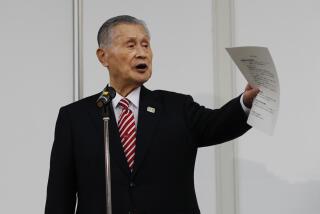Nakasone Text ‘Not Necessary,’ Japanese Official Says
- Share via
TOKYO — A Japanese Foreign Ministry spokesman said Thursday that “it is not necessary” to provide black and Hispanic congressmen a copy of controversial remarks by Prime Minister Yasuhiro Nakasone saying that the U.S. educational level is pulled down by large numbers of blacks and Hispanics.
Leaders of black and Hispanic caucuses in Congress have urged the Japanese government to release the full text of Nakasone’s speech Monday to a study group of junior members of his Liberal Democratic Party.
The Foreign Ministry’s chief spokesman, Yoshio Hatano, also said that no special envoy will be sent to explain Nakasone’s remarks to representatives of American black and Hispanic groups because “our embassy and consulates all over the United States are doing their best to explain the true intention of the prime minister’s speech.” Japanese press reports said that diplomatic missions in the United States have been deluged with complaints.
In the past, Japanese officials have sometimes gone to countries whose citizens have taken offense at remarks made by prominent Japanese.
In 1983, when the Finnish government took exception to a Nakasone statement that Japan might follow Finland’s example and fall under Soviet influence, a senior Japanese Parliament member visited Helsinki to explain the statement. Although the Reagan Administration accepted Nakasone’s explanation Wednesday that he had not intended to offend any country or minority, the remarks have prompted black American politicians to threaten to call a boycott of Japanese goods.
“I am angered by the recent insensitivity and ignorance demonstrated by the Japanese prime minister in linking the presence of ethnic diversity in our great nation with a lower intelligence level,” Rep. Mickey Leland (D-Tex.) said Thursday on the floor of the House.
Rep. Parren J. Mitchell (D-Md.) urged “all blacks and minorities to stop buying Japanese-made cars. If he (Nakasone) knows that we are inferior, then we should not use his products.” Mitchell’s speech brought a round of applause from his colleagues.
California Rep. Robert T. Matsui (D-Sacramento), who as a youngster was one of the thousands of Japanese-Americans sent to internment camps during the war, endorsed Mitchell’s remarks.
“What Mr. Nakasone said was absolutely outrageous. They in Japan are a very closed society. They discriminate against the Koreans, the Filipinos and a lot of other groups, and for them to make racist remarks against the people of our great country, who have made this country the great nation that it is, to me is outrageous,” Matsui said.
Ambassador Nobuo Matsunaga met Thursday at the Japanese Embassy in Washington with representatives of the National Council of La Raza, the Japanese-American Citizens League, the American Civil Liberties Union and the Black Congressional Caucus, as well as the Rev. Jesse Jackson, New Mexico Gov. Toney Anaya and others.
Jackson called for an apology and said that, if there is no response in 24 hours--noon today EDT--the Japanese Embassy will be picketed.
The ambassador said the statement was a misquotation and that Nakasone in no way intended to insult anyone. However, he did not offer an apology.
Responding Thursday in Parliament to accusations by an opposition politician that he had “damaged the reputation of Japan,” Nakasone said that his remarks had been taken out of context and that later in his speech he praised American achievements.
But no text of the speech was made available. Japanese TV has replayed footage of Nakasone saying “the level of Japanese society far surpasses that of the United States. There are many blacks, Puerto Ricans and Mexicans in the United States whose average level is extremely low.”
Japanese accounts varied on whether Nakasone was talking about intelligence or education levels. Two newspapers said he was referring to intelligence levels. A ruling party official said he apparently meant literacy levels.
Criticism of Nakasone’s remarks, slow to start in Japan, has come largely as a response to the U.S. reaction, which caught many Japanese by surprise.
More to Read
Get the L.A. Times Politics newsletter
Deeply reported insights into legislation, politics and policy from Sacramento, Washington and beyond. In your inbox twice per week.
You may occasionally receive promotional content from the Los Angeles Times.










